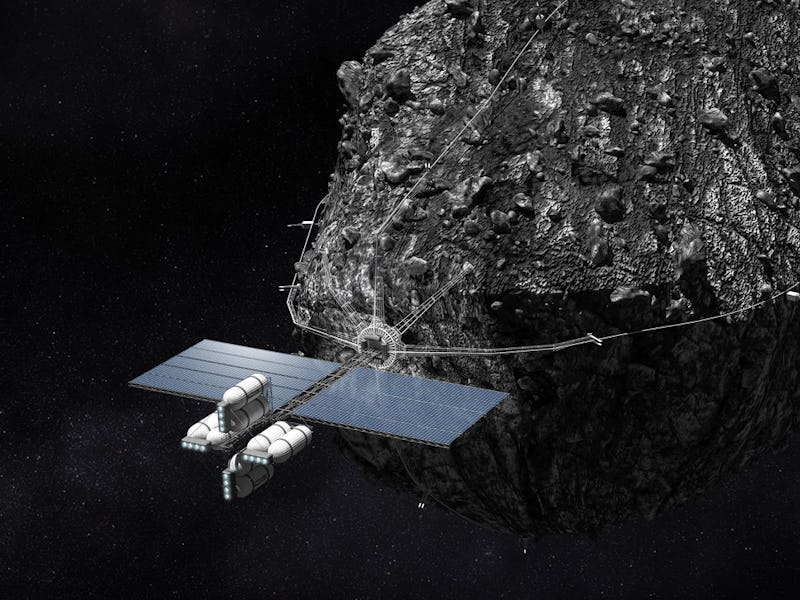Luxembourg's Push Into Asteroid Mining Forecasts the Next U.S. Space Race
One of Europe’s smallest countries is getting into the space game by drilling.

Luxembourg just announced its intentions to aggressively support asteroid mining by investing more money in companies pursuing relevant R&D projects, and to establish the legal framework designed to encourage more groups to engage in space mining operations. The country is implicitly taking aim at the U.S. and working to beat NASA and American-backed companies in what will be this century’s space race. Picture the run-up to landing a man on the moon, but with untold billions of dollars at stake.
If all that sounds strange to you, don’t worry — it is strange. Luxembourg, Europe’s eighth-smallest country, is not a power player in the world of space exploration. Though the country has been a member of the European Space Administration for some time now, most of its space-related projects have been to bolster investment in private companies working to develop and advance space telecommunications technologies meant to support what’s happening here on Earth.
But this new announcement is a signal the country wants to be a major force in the future of space mining. And for good reason. Scientists have discovered more than 13,500 near-Earth asteroids; many of those asteroids contain precious, high-platinum metals like platinum, iridium, and palladium — all of which are quite rare here on Earth; and if we ever figure out how to use water as a precursor for propulsion fuel for spacecraft, we’ll soon see water and ice become the oil of space.
When exactly we’re going to start mining big rocks floating around in space, however, is unclear. We’re nowhere near the point where we can actually send robots or humans out to different asteroids and dig up all the precious metals or water-ice we can get our grubby hands on.
Still, humans are already laying the groundwork for when space mining will really start happening. NASA’s Asteroid Redirect Mission, which will pick up a boulder off a near-Earth asteroid and place it in lunar orbit, will be something of a proving-ground mission for testing how well robotic equipment might work in asteroid environments. The U.S. SPACE Act gives private companies the rights to any resources they find in space. And several companies are already working on spacecraft systems designed to identify and potentially retrieve asteroid targets that might contain resources.
Luxembourg is simply trying to get ahead of the curve and be in a position to reap the benefits before bigger countries like the U.S. can.
“Things are moving in the United States and it was high time there was an initiative in Europe, and I am glad the first initiative is coming from Luxembourg,” former ESA head Jean-Jacques Dordain told reporters on Wednesday. “It will give no excuse for European investors to go to California.” Dordain is said to be an advisor to the Luxembourgian government.
And the country is in a prime position to become the space mining capital of the world. Luxembourg is the headquarters of SES — the world’s biggest satellite telecommunications company — and is also home to Intelsat. The country is economically stable and, like previously mentioned, has the means and willingness to invest in these types of projects.
There is a concern that any laws Luxembourg passes will violate the 1967 U.N. Outer Space Treaty, which states, among other things, that no nation or force can claim sovereignty over any sort of territory in space.
However, Luxembourg is taking cues from the way the U.S. is promoting its new SPACE Act, and it’s choosing to interpret the treaty to mean that it bars establishing sovereign over celestial bodies, but not of the resources found on those bodies.
Translation: Whatever you can pull from the ground is yours.
That’s arguably specious reasoning, but no one has been willing or really able to push back against the U.S. on that front. This gives Luxembourg the perfect shield to put forth the same argument. Economic minister Etienne Schneider likened it to the way fishermen still have the right to catch fish in international waters, even though they do not own the ocean.
But a bigger impediment to space mining hopes that hasn’t been addressed by Luxembourg, the U.S., or any other country: How to ensure legal protection for space resources that are not dug up. The U.S. SPACE Act ensures a company has the rights to anything they’ve dug up in space — not what has been discovered but not extracted. As written in a post by Forbes:
“Asteroid mining law essentially has to mirror Earth-based mining law because we’re facing exactly the same problems. The prospecting and proving of a resource is akin to a public good. Once the knowledge is there, then just as with other innovations, anyone can copy it/turn up and mine it. So, as we do with inventions (patents, copyrights) we’ve got to protect that prospecting expense with an excludable claim.”
That issue won’t be revisited until several years from now. Space mining is in its infancy, and governments and companies alike are taking baby steps before this becomes an actual toddler. Still, the world’s agencies are not talking about mining asteroids for resources as possibilities, but inevitabilities. Luxembourg’s move today may seem strange or even foolish — in just a few decades, there’s a very good chance it will be lauded as wise and prescient.